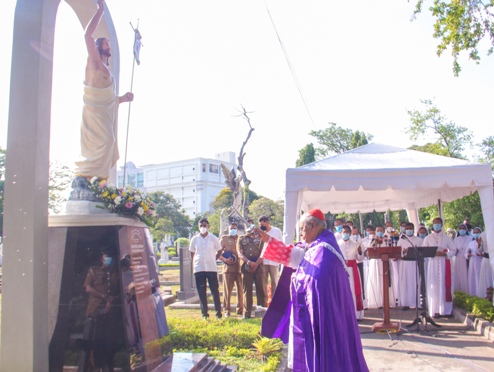Easter attack probe: Cardinal says President said couldn’t implement PCoI recommendations
COLOMBO – The head of Sri Lanka’s Catholic church, Malcolm Cardinal Ranjith, is courting controversy again, this time claiming that President Gotabaya Rajapaksa had told him he could not implement certain “unpopular” recommendations made by a Presidential Commission of Inquiry (PCoI) on the 2019 Easter Sunday bombings.
He said the President in a telephone conversation two days after the Presidential Commission report was handed over, told him it was not possible to implement everything that was recommended by the Commission, saying, “If I implement, I will become unpopular”.
Calling for international assistance in uncovering the truth he charged the government had not implemented most of the recommendations of the report, deeming it a “waste of time and a waste of hope to all of us”.
The recommendations made by the PCoI included criminal proceedings to be instituted against former President Maithripala Sirisena and others. The report also identified a number of Islamist groups accused of causing or supporting “racial and religious disturbances” and the Sinhalese Buddhist organization known as the Bodu Bala Sena (BBS), which the report said had “contributed to the events”.
The Catholic leader was speaking at a Zoom conference on Saturday (16) with the Sri Lankan expatriate community living in Australia. At least two mainstream Sri Lankan television networks aired a recorded segment of the call in their primetime news bulletin on Sunday (17).
The cardinal said that, in the run-up to the November 2019 presidential polls, Rajapaksa assured the public that the Easter attack – which had killed 269 people and injured over 500 – would be probed as soon as he came to power.
“At a meeting held immediately after his victory with the Bishops Conference and with me, he assured us and promised us that he will carry on with the decisions of the commission and he will implement all its decisions.
“But what happened was, when he received the copies of the report he immediately picked a group of ministers of his own government, which was a political decision, and not an independent one, to pick and choose whatever has to be implemented in order to protect his interests and whatever should be not implemented in order to also protect his interests (sp),” claimed Ranjith.
The archbishop has repeatedly expressed his frustration over what he has claimed is a lack of progress in finding the masterminds of the attack, which he has implied on several occasions was the result of a “grand conspiracy” – a claim originally attributed to former Attorney General Dappula de Livera.
The Easter bombings were carried out by a small band of suspected Islamist terrorists, though opposition parties in Sri Lanka, some members of the Catholic community and others have expressed scepticism over the official narrative.
In August this year, Ranjith also questioned claims that the terrorists had been backed by the Islamic State of Iraq and Syria (ISIS).
In July, Ranjith said he was sceptical of what he called a politically compromised law enforcement’s ability to probe the “grand conspiracy” behind the bombings.
Speaking on Saturday’s Zoom call, the archbishop said the PCoI had recommended the Attorney General request intelligence agencies to “inquire into a whole series of suspicious grey areas”.
“But nothing has been done because we know from inside that it is only words that they mentioned. It is only a camouflage. The people who were expecting justice and to know the truth behind these attacks have been let down very badly by the present government and the present leadership,” he said, adding, “We’re absolutely shocked and horrified about this attitude.”
Twenty-two volumes of the PCoI report, purportedly containing sensitive information, were submitted to the Attorney General on March 12, this year, over a month after the ‘final’ PCoI report was handed over to the President.
The government has been claiming for some months now that Maulavi (Islamic preacher) Mohamed Ibrahim Mohamed Naufer and an individual identified as Rasheed Hajjul Akbar, both of whom are in custody, had been identified as the only confirmed masterminds of the attack. Public Security Minister Rear Admiral Sarath Weerasekara told reporters in May that no other suspect had been identified as having masterminded the attacks and stressed that the government has no intention to hide its findings.
The Cardinal also spoke of his efforts to prevent further bloodshed in the wake of the bombings.
“We don’t want to take revenge from anybody. We’re not out for other people’s blood. When the incidents happened, there was a serious possibility of riots in Sri Lanka. We did everything possible – the church – to prevent this. We made repeated appeals along with Ven Itthapane Dhammalankara Thera.
“I repeatedly asked my people not to attack the Muslims. I protected the Muslims because we knew this attack could not have been done by seven or eight extremist Muslims. There was something big behind,” he said.
“We want to know what this big thing that happened behind this attack is. Until we know that, we will not be satisfied,” he said.
The archbishop then repeated a previous call for international assistance.
“We want the international community to back us in this struggle to find out what really happened under Easter Sunday, who really did it, who made use of those characters in order to achieve political aims. We want to know that,” he said.
-economynext.com


